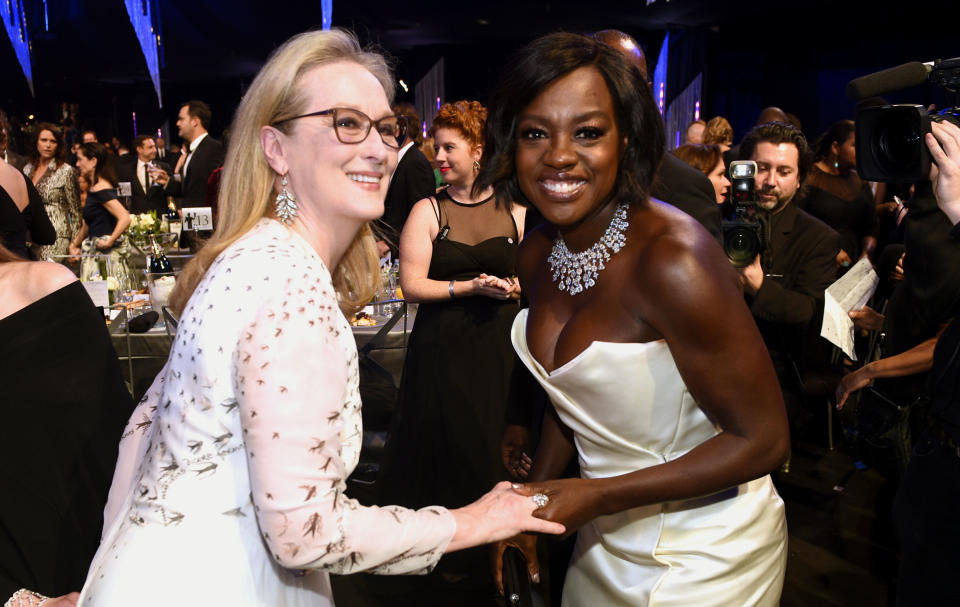Viola Davis's comments about being called Hollywood's 'Black Meryl Streep' but getting unequal pay resurface: 'Give me what I'm worth'
- Oops!Something went wrong.Please try again later.
- Oops!Something went wrong.Please try again later.
Amid nationwide protests over racial inequality, an interview with Viola Davis talking about being called a “Black Meryl Streep” — while not getting the same paychecks or career opportunities — has resurfaced.
Over the last few days, people — including celebrities like Gabrielle Union and her husband, Dwyane Wade — have been sharing the 45-second clip of Davis’s 30-minute interview with Tina Brown at the Women of the World event in 2018. In it, she talked about having the same acting education, career path and awards as some of Hollywood’s biggest actresses, but being “nowhere near them” in many ways.
This!!!!!! All day THIS!!!! 👇🏾👇🏾👇🏾👇🏾 https://t.co/z0Bq84x2Lp
— Gabrielle Union (@itsgabrielleu) July 1, 2020
“I got the Oscar, I got the Emmy, I got the two Tonys, I've done Broadway, I've done off-Broadway, I've done TV, I've done film, I've done all of it,” Davis said. “I have a career that's probably comparable to Meryl Streep, Julianne Moore, Sigourney Weaver. They all came out of Yale, they came out of Juilliard, they came out of NYU. They had the same path as me, and yet I am nowhere near them, not as far as money, not as far as job opportunities, nowhere close to it.”
The Academy Award winner, who attended Juilliard, continued, “But I have to get on that phone and people say, ‘You're a Black Meryl Streep. There is no one like you.’ OK, then if there’s no one like me, you think I’m that, you pay me what I’m worth. You give me what I’m worth.”
The How to Get Away With Murder star’s interview was a wide-ranging one, about the hot topic that year — the #MeToo movement — and also gender pay disparity. But she made the point that while women in Hollywood were being paid less than men, Black women were being paid much less than their white peers.
“We won’t talk about gender inequality of pay,” she said, “because a lot of the women who stepped — and I stand in solidarity with them, OK — what they’re getting paid, which is half of what a man is getting paid, well, we getting probably a tenth of what a caucasian woman gets and I’m number one on the call sheet. Then I have to go in and I have to hustle for my worth. That’s what I feel like I’m doing. Listen, I have more than a 30-year professional career.”
Davis said during the interview — which made headlines at the time — that the demand for equality goes beyond paychecks. She wanted the roles of complicated women — not the best friend, “the third girl from the left” and so on.
She also called out how young white actresses — citing Shailene Woodley — saying she was talented and “fabulous,” but landed some 37 magazine covers in one year while “some actress of color whose the same level of talent and everything who may have gotten four. And there is a sense in our culture that we have to be happy with that.”
Davis, who is known for giving powerful speeches (usually while accepting her many awards), vowed that she would no longer “hustle for [her] worth” in the business.

For the record, Davis is close friends with Streep, working with her in 2008’s Doubt. And not just awards show friends — they text and talk with Davis saying a quality she loves in Streep is that, “I always feel like she sees me.” In 2017, Streep publicly heaped praise on Davis in an essay for Time magazine’s influential people list, saying Davis "embodies for all women, but especially for women of color, the high-wire rewards of hard work and a dream, risk and faith."
Along the same lines as Davis’ interview being recirculated, an old interview with Killing Eve star Sandra Oh has also gone viral too. It is from the early 2000s — during her time on Arli$$, but before she really rocketed to fame on Grey’s Anatomy — and she talked about racism against Asians in Hollywood. She told interviewer Keith Morrison, “Some people would say we’re not good looking” or that a white woman should be in the lead. Similarly, she said, white people were picked over people of color to produce and write.
Sandra Oh talking about racism in the industry (1999?). The way the interviewer tried to gaslight her and she was like NOPE pic.twitter.com/uVB3mAIEHU
— kae (@SandraHive) June 18, 2020
“Oh come on,” Morrison replied to Oh. He then seemingly joked about “middle age white guys” running things, while putting his arms up and smiling obviously as one.
Oh went on to talk not just about racial inequality, but gender too.
Like Davis, Oh has continued to be a prominent voice about racial inequality through the years, though some of what they’ve said, like these clips, took some time to really hit home.
Read more from Yahoo Entertainment:


